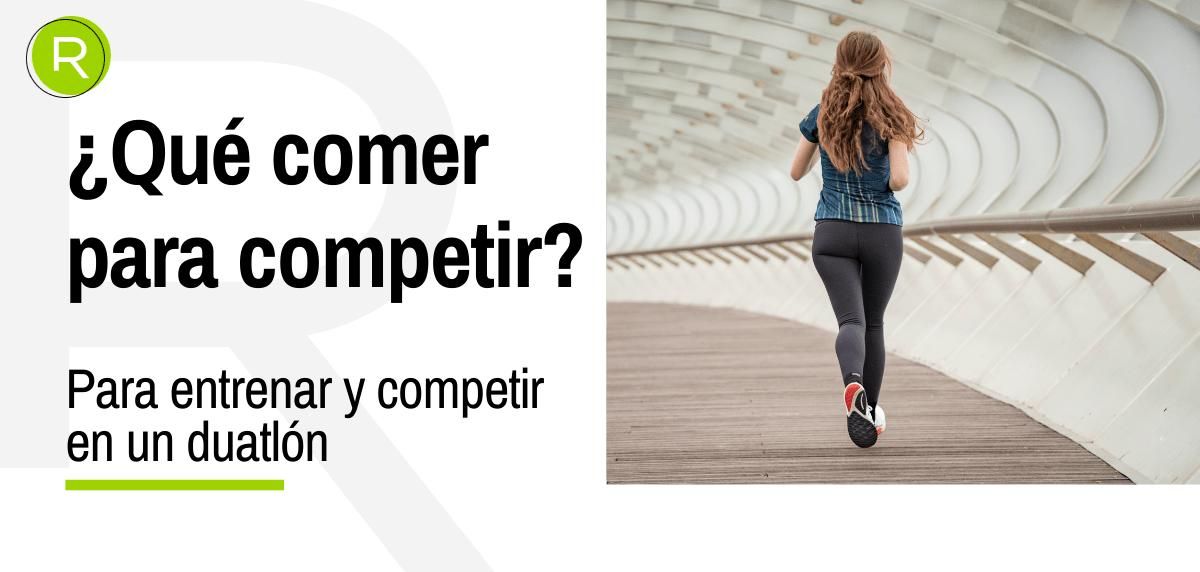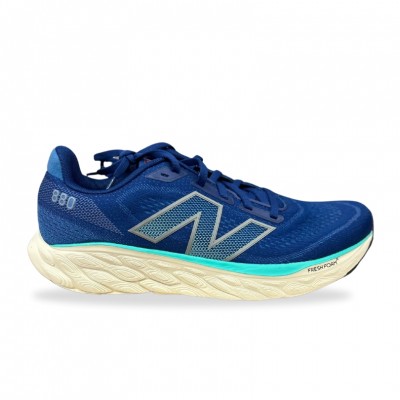A duathlon is a race that consists of a running segment, followed by a cycling segment, and finishing with another running segment. The distances of a duathlon can vary:
- Sprint distance: 5 km/20 km/25 km.
- Olympic distance: 10 km/40 km/5 km.
- Long distance: 14-12 km/60-75 km/7-12 km.
If you are training for a duathlon, you should eat a balanced diet every day, consisting of three main meals and two snacks (mid-morning and afternoon snack). It is important to stay hydrated before and during any race.
The eating plan during the race should be trained together with the physical training to avoid unpleasant surprises.
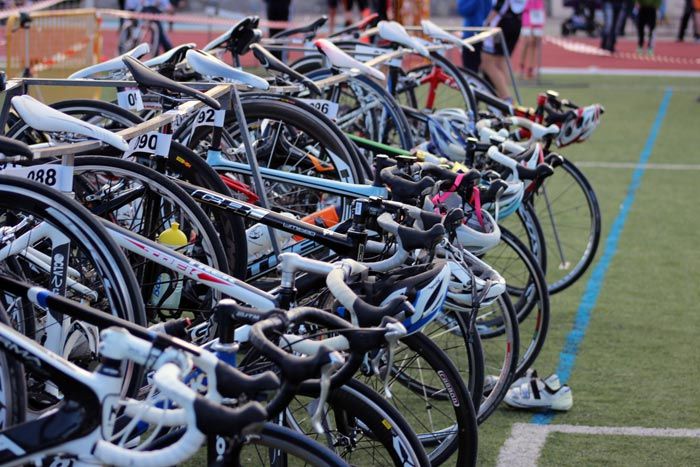
TRAINING
During the training stage, keep in mind that the diet should be balanced and should maintain a correct intake of carbohydrates (5) and protein (12.7g/kg) spread over about 5 meals a day.
On training days, the diet will be richer in kilocalories than on rest days. If the goal is to lose weight or fat mass, it should be taken into account that the diet should be personalized, according to the training and the final goal. Some tips are:
- Do not make too strict diets.
- Always eat something before training.
- Ensure a minimum of carbohydrates per day to obtain the necessary energy for the physical activity performed3).
- Provide carbohydrates at all meals, if possible, favoring slow absorption carbohydrates (bread, pasta, rice, potatoes, legumes, etc.).
- Reduce fats in the diet.
The dietary pattern must be accompanied by a correct supplementation. This will help us to be able to maintain a good performance and to test how we feel the supplementation that we are going to use in the races.
A) During training
If the training is less than 90 minutes, you can simply hydrate with water.
If the training is longer than 90 minutes in continuous:
- The first hour you can drink only water.
- From the second hour onwards, drink 500-600ml of isotonic drink every hour.
- Every 60 minutes or so, provide carbohydrates through a fruit, a gel or a bar.
B) After training
Rehydrate properly by monitoring the weight lost in training. Ideally, multiply the weight difference by 15 to find out how much fluid you should drink.
If you are going to do intense training for more than 25 hours, you should take a recovery drink3 carbohydrates/1g protein) right after exercise, to regain strength.
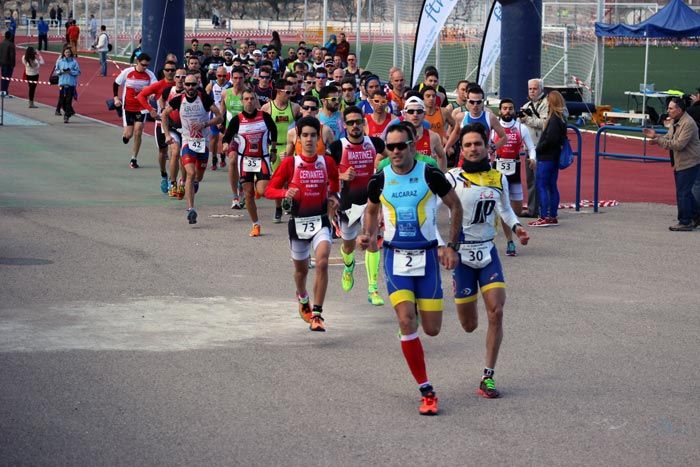
COMPETITION
It is advisable to start the feeding program two nights before the race to maintain the energy level. Two or three days before the race, it is recommended to overload carbohydrates9 HC/kg) in order to arrive with full muscle glycogen stores.
During the race take the supplementation and hydration as it has been tested during training and taking into account the type of duathlon we are doing. A Sprint is not the same as an Olympic race. It is necessary to think that it is necessary to take a minimum of calories but that an excess can be harmful because we can have gastric problems.
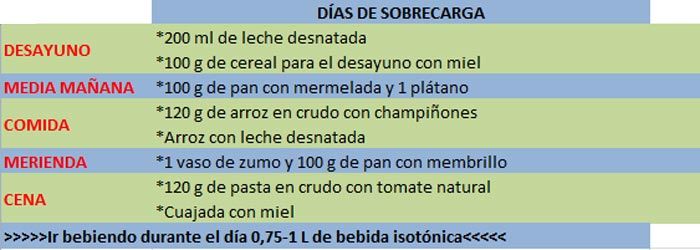
Sometimes this diet can be heavy and unpleasant for the athlete, so it is advisable to try it beforehand during the training stage. If you do not feel well, these days you should simply increase the carbohydrates in your diet without having to reach that limit.
The day before the competition
In addition to following a diet rich in carbohydrates, on this day you should not try anything new that might be bad for you. You should also avoid fatty foods and fiber, ie: whole foods, legumes or excess vegetables.
- The day before make a main meal rich in carbohydrates with low-fat protein foods.
- At dinner eat less food than usual, making a small load of carbohydrates easily absorbed, so that in the morning you do not have empty your glycogen stores. Try to eat dinner 12 hours before the start of the race.
- Eat low-fat foods. Do not eat fatty dairy products.
- Avoid spicy foods.
- Avoid foods with a lot of fiber (it is responsible for the gases that end up producing flatus).
- If we want to take some fruit that is low in fiber (banana for example) or juice that decreases its fiber.
- Hydrate yourself very well.
The day of the competition
Previous hydration
- Drink 250-500 ml of water before the race, preferably with breakfast.
- Drink 250-500 ml of electrolyte drink 20 minutes before the start of the race. Stop consuming liquids 15 minutes before the start of the race.
During the race or whenever you feel comfortable, drink according to thirst. If the race lasts less than 90 minutes, water is sufficient; if the event lasts more than 90 minutes, it is advisable to hydrate with a sports drink. Remember that it is vital for your performance that you stay hydrated throughout the race.
Supplementation: Supplement with the same products and the same guidelines tested during the training season.
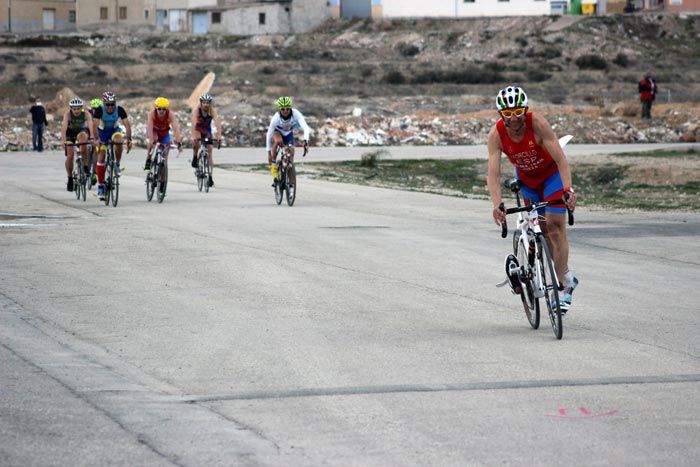
Race morning
Do not take anything new in your diet that day.
Eat breakfast a couple of hours or three hours before (so that digestion is almost complete and all nutrients have been assimilated). You can have a normal, carbohydrate-rich breakfast to do a glycogen load, as long as your body responds well and you have it checked. Fruit that is low in fiber or juice. If you eat yogurt make it low-fat. Examples of breakfast:
- 2 skimmed yogurts + non whole grain cereals or toast with quince + fruit juice.
- 1 bottle of fermented skimmed milk + bread roll with tuna + banana.
If your stomach can't take anything because of the nerves of the race, try to take a few energy bars or a shake containing carbohydrates little by little.
During the race (e.g. Duathlon Sprint)
Once the race has started, as it is a short race, there will only be 2 hydration stations. So make sure to:
- Take the first glass of water at the first refreshment station at km 4 of the first leg of the run which will last 5 km in total.
- Once on the bike, during the 30-35 minutes that you will ride the 20 km distance, try to cover about 300 ml of isotonic drink in small sips. Around km 5 of the bike section, as you will need more energy, taking a gel will be the most practical and effective solution, it will provide you with fast absorbing H.C.. If you prefer, you can take one with caffeine.
- In the last transition and the last part of the 25 km run. Take advantage of this and drink again at the second refreshment point at about 05 km.
After the race
At the end of the race, recover and rehydrate with a 3 or 4/1 recovery drink to hydrate, replenish electrolytes and fill your glycogen stores.
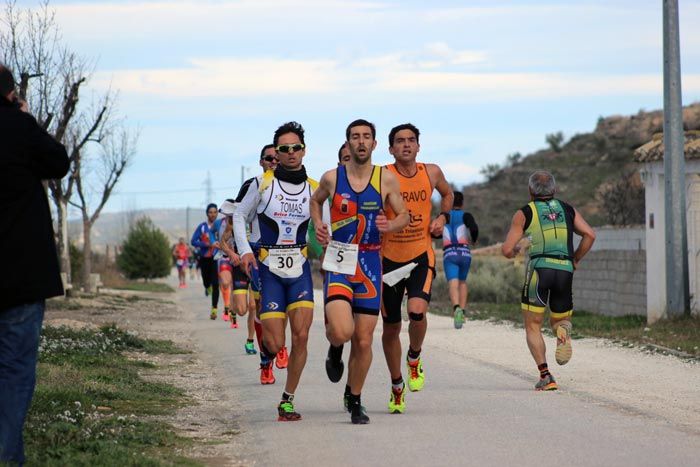
Read more news about: Nutrition
